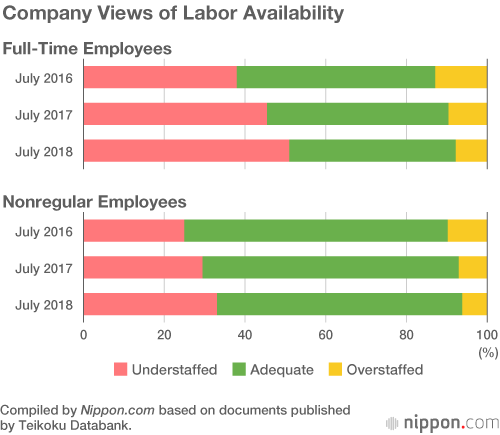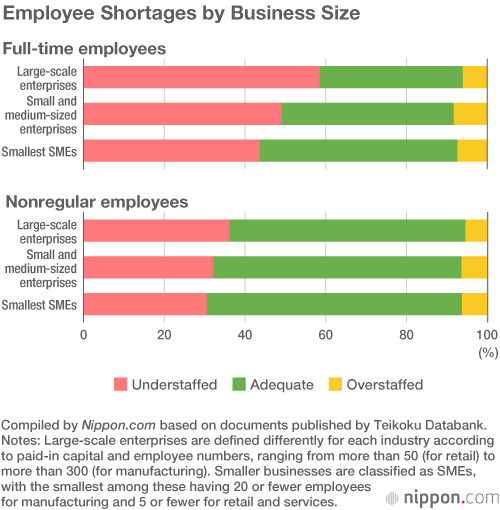
Majority of Companies Claim a Shortage of Full-Time Employees
Economy- English
- 日本語
- 简体字
- 繁體字
- Français
- Español
- العربية
- Русский
The results of a corporate trends survey on employee shortages conducted by the private research organization Teikoku Databank were released in July 2018. For the first time, more than half of the surveyed companies, 50.9%, responded that they do not have enough full-time employees. This rate, having already risen from 37.9% in July 2016 to 45.4% in July 2017, further indicates the increasing shortage of workers in the corporate sector.

Looking at each industry by category, the field that evaluated itself as having the highest shortage was information services, including software development, with 71.3% (a 1.6 point increase from the previous year), followed by transport and warehousing at 67.6% (a 6.7 point increase), construction at 66.3% (a 6.8 point increase), maintenance, security, and inspection at 66.2% (a 9.5 point increase), home electronics and information appliances retail at 63.9% (a 2.4 point increase), and transportation machinery and equipment manufacturing at 62.9% (a 25.4 point increase). As can be seen from these figures, increases have occurred across the board from the previous year.
Top 10 Industries Reporting Full-Time Worker Shortfall (%)
| July 2016 | July 2017 | July 2018 | |
|---|---|---|---|
| 1. Information services | 60 | ↑ 69.7 | ↑ 71.3 |
| 2. Transport and warehousing | 48.1 | ↑ 60.9 | ↑ 67.6 |
| 3. Construction | 53.2 | ↑ 59.5 | ↑ 66.3 |
| 4. Maintenance, security, and inspection | 50 | ↑ 56.7 | ↑ 66.2 |
| 5. Home electronics and information appliances retail | 65 | ↓ 61.5 | ↑ 63.9 |
| 6. Transportation machinery and equipment manufacturing | 25.8 | ↑ 37.5 | ↑ 62.9 |
| 7. Temporary staffing and placement | 41.7 | ↓ 40.4 | ↑ 62.1 |
| 8. Broadcasting | 76.9 | ↓ 61.5 | → 61.5 |
| 9. Restaurants | 51.3 | ↓ 46.3 | ↑ 58.5 |
| 10. Leasing and rental | 38.6 | ↑ 52.9 | ↑ 58.4 |
Compiled by Nippon.com based on documents published by Teikoku Databank.
Teikoku Databank also categorized responses according to the size of the business, as defined in the Small and Medium-sized Enterprise Basic Act. The results showed that 58.5% of large-scale enterprises and 49% of smaller businesses evaluated they were understaffed. Within the category of small and medium-sized businesses, 43.6% of the smallest firms responded that they had shortages. There is a visible trend showing that the larger the business, the more seriously the employee shortage is felt.

Regarding nonregular employees, 33% of companies responded that they were understaffed (a 3.6 point increase from the previous year). In contrast, 60.8% of companies felt they had an adequate number (a 2.7 point decrease) and 6.2% responded that they were overstaffed (a 0.9 point decrease).
(Translated from Japanese. Banner photo © Pixta.)